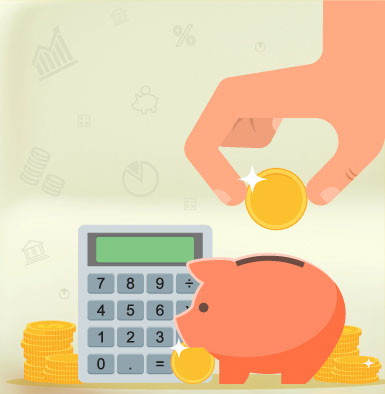What Are The Closing Costs Associated With Buying A Home In Ghana?
What Are The Closing Costs Associated With Buying A Home In Ghana?
- by PropHunt Admin
- On 08-11-2023
- at 7:26 PM

Whenever there is talk of closing costs, there are home loans. Home loans are loans that were introduced in Ghana to enable first-time homebuyers and existing homeowners to access quality housing with ease. However, the process of securing a home loan does not come free; it comes with loan fees and closing costs.
There are many costs associated with purchasing a property in Ghana. These costs go above the asking price declared by the seller and are usually assumed to be the market price of the property. However, a first-time buyer in Ghana will only focus on the basic price, which is the rate per square foot.
Before we look at some of the closing costs associated with buying a home in Ghana, let's understand what closing costs are and how much a homebuyer can save towards owning a home in Ghana.
What Are Closing Costs?
Closing costs are the expenses that you pay when finalising a home purchase in Ghana. These costs include but are not limited to, application fees, appraisal fees, attorney’s fees, and title fees. But, depending on your specific home loan in Ghana, there could be other costs as well. With real estate agency commissions and taxes included, total real estate closing costs can approach 15% of a property’s purchase price.
What Are Upfront and Hidden Costs?
Upfront and hidden costs are costs that are not necessarily spelt out in any glossy real estate advertisements and can add a significant sum to the purchase price of a property. In view of this, it’s important that homebuyers in Ghana understand these extra costs and know that almost all of the costs depend on the value of the underlying property being purchased and where it’s located.
10 Closing Costs to Consider When Purchasing a Property in Ghana
It is important to note that these are some of the closing costs that may be incurred when purchasing a property in Ghana. The actual closing costs may vary depending on the specific transaction.
1: Appraisal Fee
In Ghana, these fees are called valuation fees. This is because of the services rendered by a valuer in estimating the value of the property. This service is usually a requirement from lenders to ascertain a lender's cushion of the money being lent to the borrower and the actual value of the property. An appraisal is also done to inform lenders if the property is worth more than what they are lending.
2: Stamp Duty
Stamp duty is a property transfer tax that's owed when ownership of real property transfers from a seller to a buyer. In many cases, these taxes are small, but they can be substantial in some areas of the country. For example, in Ghana, a stamp duty is levied on the property's value at progressive rates, from 0.25% to 1%.
3: Loan Origination Fees
Loan origination fees are a percentage of the loan amount that lenders charge the borrower in order to process the loan. Sometimes lenders combine the loan origination fee with the loan application fee. Loan origination fees are typically paid at closing, and they can add to the overall cost of the loan. Borrowers should shop around for the best loan terms, including the lowest origination fee, before applying for a loan.
4: Mortgage Insurance Fees
Though it is not common, in a situation where you make a down payment of less than 20% on a home, you will likely have to buy private mortgage insurance. This is a type of insurance that protects the lender in case you default on your loan. Lenders in Ghana dislike it when their loans become bad debts. Lenders want to keep their money safe, so they require some level of cushion against their risks in order not to record bad debts in their books.
Also, the cost of the insurance is typically rolled into your monthly mortgage payment. So that your monthly payments will include the principal, interest, and insurance. The amount of private mortgage insurance you pay will depend on your loan amount, down payment, and credit score. However, you can easily cancel private mortgage insurance once you have 20% equity in your home.
5: Mortgage Registration Fees
The mortgage registration fees are charged by the Land Title Registry when a mortgage is registered on a property. The mortgage registration fees are 1% of the loan amount. The fees are used to cover the costs of registering the mortgage and ensuring that it is recorded in the public land registry. The mortgage registration fees are typically paid by the borrower, but they can also be paid by the lender.
6: Inspection Fee
Homebuyers in Ghana don’t really take home inspections seriously. For some reason, they believe it is something they can do themselves, but you can’t avoid it when going in for a loan. Home inspections are done to check the state of a property before the lender issues a loan. Similar to an appraisal, mortgage lenders want to make sure the property they’re lending against is in good condition and not damaged.
7: Survey Fees
These are fees that are charged by the surveyor who surveys the property. Surveyors outline the dimensions of a property to create a map that outlines legal boundaries and land features. This is important because it ensures that the property lines are accurate and that there are no disputes about who owns what land. Surveys are also necessary if someone is buying part of a parcel or buying multiple parcels that may be combined as part of the sale. This is to ensure that the buyer is getting exactly what they are paying for.
8: Title Search Fees
A title search is done in Ghana by the Lands Commission with the help of your real estate agent. The Lands Commission charges a fee that is based on the cost of the search and the time it takes to complete it. The search will reveal any liens, judgments, or other encumbrances on the property. The title search fee is typically paid by the buyer at closing, and usually, the fee is flat, but it may vary depending on the location of the property and the complexity of the title.
9: Legal Fees
The legal fees charged by a lawyer for the purchase of a property in Ghana vary depending on the complexity of the transaction. In general, the fees will cover the lawyer's time and expertise in reviewing the purchase contract, title search, and other documents related to the sale. The lawyer may also charge additional fees for services such as negotiating the purchase price, preparing the closing documents, and representing the buyer at the closing.
10: Property Transfer Tax
A property transfer tax is a tax that is levied on the transfer of ownership of real property. The rate of the property transfer tax is typically 5% of the purchase price of the property. The tax is usually paid by the buyer of the property, but it can also be paid by the seller or both parties. The tax is used to fund local government services, such as schools, roads, and libraries.
10: Agent Commissions
The commission is 5% of the purchase price but can be as high as 10% or more, depending on the specific broker and property type. The commission is split between the listing agent and the selling agent, each of whom typically receives 2.5% to 3% of the purchase price. The commission is paid at closing, which is when the sale of the property is finalized. The buyer's lender will typically require the buyer to have the commission funds available at closing.
Conclusion
It is important to note that these are just some of the closing costs that may be incurred when purchasing a property in Ghana. The actual closing costs may vary depending on the specific transaction.

 French
French




